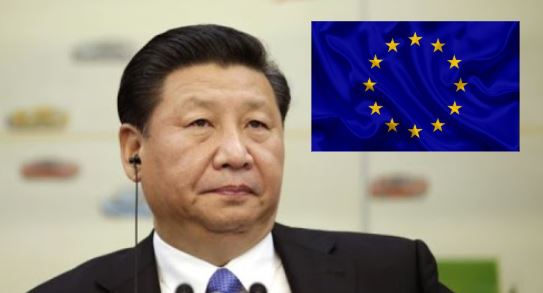Seven years into Chinese President Xi Jinping’s Belt and Road Initiative (BRI), it is becoming clear that the BRI is no Marshall Plan. Far from expanding China’s soft power and influence, the usury associated with the BRI is making Beijing a pariah and forcing power centres across the world to counter the Chinese infrastructure programme. Till now, it was just the QUAD which was opposing the BRI, but now even the European Union (EU) is looking to destroy China’s BRI.
China was looking to gobble up the Balkans with its predatory investments under Xi Jinping’s flagship BRI. However, as per a latest SCMP report, a senior EU official has now said that the Brussels-based intergovernmental body would “up our game” with China. The official made these remarks after the EU earmarked a €9 billion (US$10.5 billion) fund for the Balkans, which seems to be becoming the battleground of systemic EU-China rivalry.
The EU is the latest bloc to create a formidable front against Beijing’s BRI, whereas the QUAD- an informal strategic alliance comprising India, Australia, Japan and the US is already making efforts to hold back China’s growing influence. India and the US, for example, shown shared interest in the Blue Dot Network (BDN) Project, which is supposed to serve as a globally recognised certification system for infrastructure investments.
BDN will create a certification system for roads, ports and bridges with special emphasis on the Indo-Pacific region and therefore hurt China’s BRI which is invariably low on quality and high on cost. Similarly, India- a QUAD member is also working with Russia to explore opportunities for development of railways and other infrastructure projects in Asia, Africa and Latin America. India’s idea is to again keep China at bay in regions where Beijing is relentlessly pushing BRI projects.
Similarly, Tokyo is wooing African and Southeast Asian countries in a bid to keep them away from China. QUAD is therefore taking care of the Indo-Pacific, and therefore Beijing’s next target is the poor economies located in Balkans and Eastern Europe. But it seems that the Brussels-based EU will not let China have its way so easily.
As far as the Balkans is concerned, all the countries in the region are members of Chinese President Xi Jinping’s Belt and Road Initiative (BRI). The focus of China’s BRI ambitions in the Balkan Peninsula has been the Western Balkans. Bosnia and Herzegovina, Montenegro, North Macedonia and Serbia have all received extensive loans from Beijing under the BRI. Serbia alone has secured 4 billion US dollars in investments and 5 billion US dollars in loans from Beijing, apart from infrastructure projects.
China wants to be the only giant investing in infrastructure projects in the Balkans. Beijing is therefore working on some ambitious projects in the region such as Chinese State-owned company’s Road and Bridge Corporation’s project to build the first highway in Montenegro.
There is a history of Chinese projects going wrong in the Balkans. Earlier this year, there was a major environmental accident in Smederevo, Serbia. The accident was associated with Smederevo Steel Plant of a Chinese company- Hubei Iran & Steel Group. The accident resulted in a hazardous black powder covering the town, orchards, fields and even vineyards.
Another incident associated with China’s infrastructure development in the region resulted in Montenegro’s Tara river getting adulterated with tons of gravel, soil and waste.
Chinese projects in the Balkans often tantamount to “ecological terrorism”. But cash-strapped economies in the Balkans are falling prey to China’s “easy money” and are either unaware of how they are being entrapped by the paper dragon or simply refuse to accept that China is gobbling them up. These governments haven’t been able to bank upon another giant to beat back China’s commercial invasions.
However, the EU is now realising that the Balkans is its responsibility and sphere of influence to handle. Jonathan Hatwell, head of the China division at the EU’s diplomatic arm said, “What gives rise to the potential concerns in the region is the interplay between the substantial and not always transparent Chinese investments and the currently relatively weak institutional framework [in the Western Balkans].”
The EU is realising that the Western Balkans is located right at its doorstep and therefore it cannot let China run over the region. According to Hatwell, the Brussels-based bloc would have to sharpen its communication with the Western Balkan region in order to correct wrong perceptions.
Hatwell said, “We need to up our game in terms of communication because there is this mistaken and slightly bizarre and frustrating perception in the region, and we saw that again recently in relation to the support of the pandemic that the EU is doing very little in these countries and China is doing a lot. If you actually drill down into the figures, the reverse, if anything, is true.”
And as for combating China’s “easy money” bait, the EU plans to provide guarantees of €20 billion in the next decade in order to reduce investor risk and decrease the cost of financing for public and private investments.
The message coming from the EU is loud and clear- China cannot simply overwhelm Western Balkans with predatory BRI projects. After the QUAD, now the EU is making a major attempt to demolish BRI.
